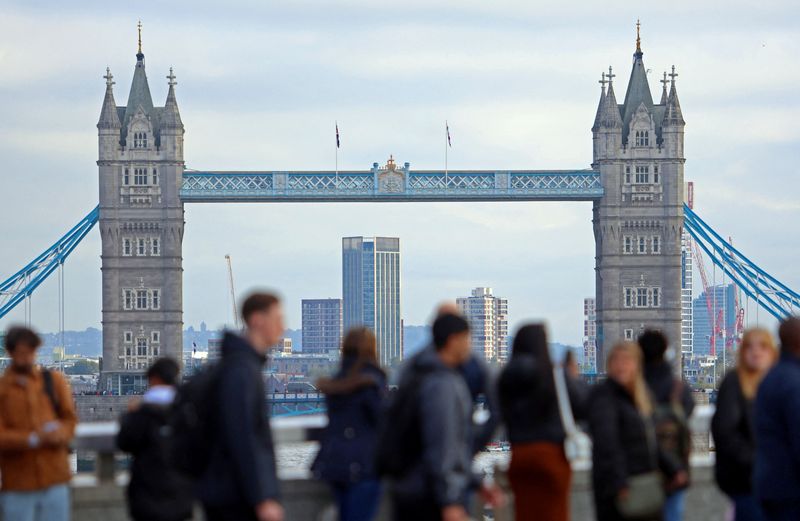LONDON (Reuters) -British pay growth cooled in the three months to July to a more than two-year low and employment shot higher, according to data on Tuesday which is likely to keep the Bank of England on track to cut interest rates again before the end of the year.
British average weekly earnings, excluding bonuses, were 5.1% higher than a year earlier in the three months to the end of July, the Office for National Statistics said on Tuesday, matching the consensus in a Reuters poll of economists.
It was the lowest reading since the three months to June 2022.
Sterling ticked higher against the dollar briefly on the back of the figures, which were broadly as expected, before settling back again.
When it cut interest rates on Aug. 1 after keeping them at a 16-year high of 5.25% for nearly a year, the BoE said it would continue to keep a close eye on wage growth. Investors see a roughly one-in-four chance of a September BoE rate cut.
Luke Bartholomew, deputy chief economist at asset manager abrdn said the data probably left the debate around the BoE’s future moves unchanged.
“There are still a few important data reports before the Bank needs to decide on interest rates again, but as things stand it is hard to see a cut next week. Instead, we expect the next cut to come in November,” he said.
Economists polled by Reuters also expect the next rate cut to take place in November, rather than on Sept. 19.
Britain’s economy added 265,000 jobs in the three months to July, the ONS said, far more than expected by economists in the Reuters poll which had pointed to a 123,000 increase.
The ONS repeated its warnings about the flaws of the Labour Force Survey, which produces employment and unemployment data, but not the headline wage figures. The methodology is due to be refreshed in December’s release.
The unemployment rate fell to 4.1%, slightly down from 4.2% in the three months to June, and its lowest since the three months to January 2024.
In July, Britain’s new finance minister Rachel Reeves approved pay rises of at least 5% for millions of public sector workers.
The BoE is more focused on private sector pay which it forecasts will slow to 5% in late 2024 and 3% in late 2025.
Excluding bonuses, private sector pay growth cooled to 4.9% in the three months to July – putting it on track to meet the BoE’s forecast of 4.8% for the third quarter as a whole.
The BoE also looks at other inflation pressures such as labour shortages, which leapt during the COVID-19 pandemic.
The number of unfilled job vacancies fell to a more than three-year low of 857,000 in the three months to July, down from 1.3 million in mid-2022 but still higher than in early 2020.




